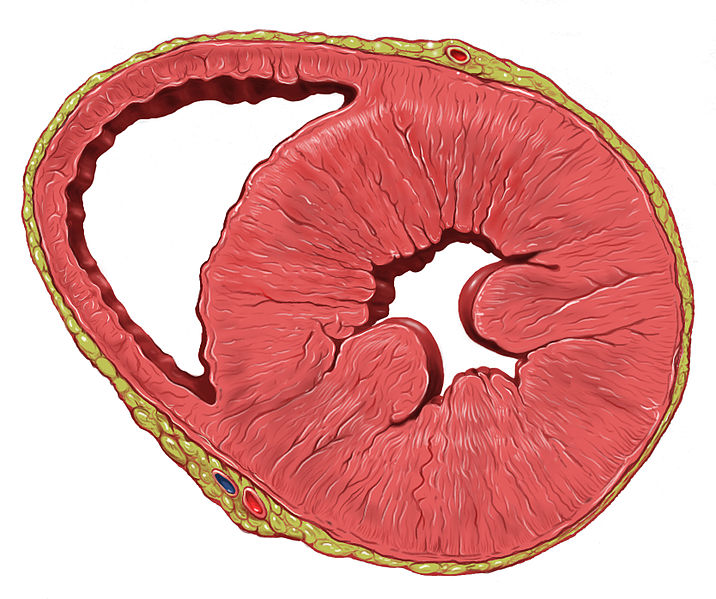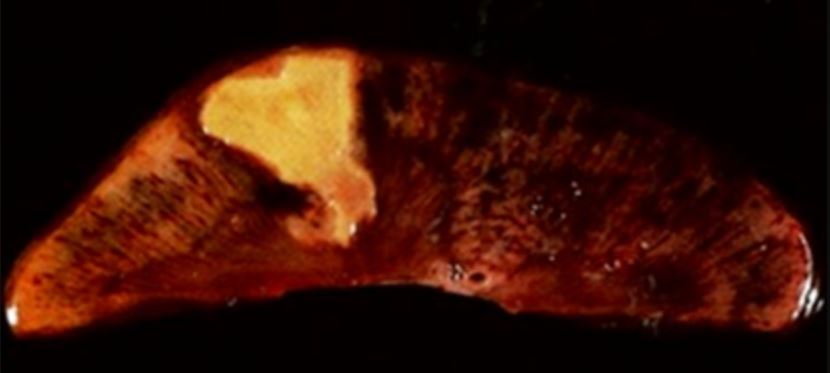Playlist
Show Playlist
Hide Playlist
Metaplasia
-
Slides Cellular Pathology Adaptation to Injury.pdf
-
Reference List Pathology.pdf
-
Download Lecture Overview
00:01 Let's talk about Metaplasia. 00:02 So you may, many of you are already familiar with atrophy, hypertrophy and hyperplasia. 00:08 But let's talk about metaplasia, which is one you may not be so familiar with. 00:12 This is replacement of one adult tissue type with another. 00:15 Again, this is an adaptation. 00:17 Something has happened to the cell or through the tissue, and it's saying, "dang" I need to do something or I'm going to be dead. 00:25 So it undergoes a change. 00:27 There is a rewiring, a reprogramming of the cells or of stem cells, in this case, to make another mature cell type that is better able to withstand whatever the injury is. 00:41 It is entirely reversible. 00:44 So a good example is shown here on the top panel labeled one. 00:47 This is squamous metaplasia. 00:48 The normal bronchial epithelium is a pseudostratified columnar epithelium. 00:56 So columnar cells, tall, elegant cells. 01:00 If I or you or your patient smokes invades the surface of these cells with the... that are in cigarette smoke. 01:10 The stem cells say, you know what? This is a trauma that we're not going to survive if we're going to stay as these tall columnar cells, we're gonna become squamous. 01:19 We're going to become a different looking cell. 01:23 It's not malignant. 01:24 It's just a change in the phenotype, and this is better able to withstand whatever it is in the cigarette smoke that was particularly noxious or toxic. 01:32 So you get a squamous metaplasia. 01:34 Now that's an interesting adaptation. 01:36 The tissue is now able to withstand cigarette smoke a whole lot better, except we've lost an important function. 01:42 Remember those tall, elegant, bronchial epithelial cells, columnar cells on the surface. 01:48 They have little cilia on those cilia beat and move mucus out that contains bacteria inhaled particulate matter When we go to squamous metaplasia in the lung, we don't have that anymore. 02:00 We don't have the cilia on the surface of those squamous cells. 02:04 And now I'm not able to clear secretions that are down in there. 02:09 And smokers are more prone to getting pneumonias and two other bacterial infections because they can't sweep the stuff out. 02:16 So it's a maladaptive adaptive response. 02:20 Another one, happens in the GI tract, so it's not just from a columnar cell to a squamous cell, it go the other way. 02:27 So Barrett's intestinal metaplasia. 02:29 This is happens in the esophagus. 02:32 The esophagus is normally a stratified squamous epithelium. 02:35 It is lots of plates of layers of cells. 02:39 And that's fine, if all it has to do is live as food goes down that chute into the stomach. 02:45 But if you have reflux, or you get stressed with multiple exams, you medical students out there. 02:51 You reflux gastric acid into that lower esophageal segment. 02:55 That acid actually now acts as an irritant and a toxin potentially to the epithelium. 03:01 It turns out, squamous epithelium doesn't do so well against hydrochloric acid. 03:06 But if I make it look more like gastric or intestinal epithelium, I make it cuboidal epithelium it looks like stomach or small bell that does a whole lot better. 03:17 So in reflux, chronic reflux, I convert the squamous epithelium of the lower esophageal segment to intestinal or gastric epithelium. 03:28 That's called Barrett's metaplasia. 03:31 It's able better to withstand hydrochloric acid, but that is also a fertile ground for conversion into Esophageal Adenocarcinoma. 03:40 So again, potentially a maladaptive adaptive event that's metaplasia.
About the Lecture
The lecture Metaplasia by Richard Mitchell, MD, PhD is from the course Cellular Injury.
Included Quiz Questions
Metaplasia is...?
- ...the replacement of one adult tissue type with another.
- ...an increase in cell number.
- ...an increase in cell size.
- ...the replacement of normal tissue by abnormal tissue.
- ...the replacement of normal tissue by fibrous tissue.
Which of the following best describes metaplasia?
- It is a reversible process.
- It represents a rare process and produces an abnormal tissue structure.
- It is basically uncontrolled growth of cells.
- It signifies loss of differentiation.
- It is another term to indicate tissue invasion and/or metastasis.
Customer reviews
5,0 of 5 stars
| 5 Stars |
|
5 |
| 4 Stars |
|
0 |
| 3 Stars |
|
0 |
| 2 Stars |
|
0 |
| 1 Star |
|
0 |





